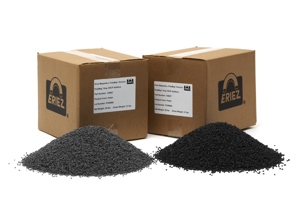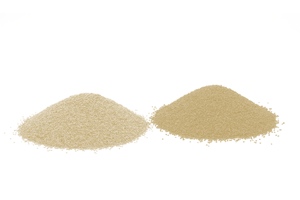
Trends in metal-detectable plastics in food
By John Collins
Food Safety Research & Development Health & Wellness contamination EriezFinding effective measures to prevent product contamination continues to be a priority for food manufacturers

Food safety vigilance and increasingly stringent government guidelines continue to drive the importance of keeping foreign material out of food and food ingredients. More often than not, the threat to food safety comes when some unwanted element – a fragment of metal, a piece of rubber, plastic or grain husk – enters a food ingredient or its package.
Technological improvements in both equipment and chemical additives are helping food processors detect and reject unwanted elements before the final product reaches consumers, helping to ensure product safety and quality while reducing the risk of unwanted media attention and legal snafus.
Ensuring effective measures to prevent contamination of food products is a major concern for food manufacturers. Not only do contamination accidents require production line stoppages and incur huge costs, they also involve vast amounts of time and money to regain social trust. In addition, foodservice safety guidelines are affecting not only how food is prepared, but the types of products used in food manufacturing. For example, major restaurant chains insist that food processors now use plastic and rubber articles that are metal and x-ray detectable. This has become part of many company’s HACCP (Hazard Analysis Critical Control Point) programs.
Improving detectability
Metal detectors and x-ray machines have long been used to detect metal and non-metal contamination in food processing operations. The trend today is the continued improvement in the detectability of supplies and equipment, including those made of plastic or rubber.
Ordinary plastics cannot be detected by metal detectors or x-ray machines. However, by incorporating new additives during manufacturing,  broken pieces or fragments of plastic materials can be detected by a metal detector before getting mixed in with food products. This allows manufacturers to prevent contaminated products from reaching the market. Detectable additives can be infused during manufacturing to slightly magnetize some of the plastics, so they can be separated by magnetic separators or detected by metal detectors.
broken pieces or fragments of plastic materials can be detected by a metal detector before getting mixed in with food products. This allows manufacturers to prevent contaminated products from reaching the market. Detectable additives can be infused during manufacturing to slightly magnetize some of the plastics, so they can be separated by magnetic separators or detected by metal detectors.
By incorporating these special additives, such as the Eriez PolyMag Process, manufacturers can expand current product lines to offer detectable versions of existing products, or even introduce brand new offerings. This unique process renders the plastic resin magnetic with an additive (high-concentration pellets) in a process similar to adding colour concentrate. The quantity of the magnetic additive is extremely small and does not affect the physical properties of the plastic.
How the additive process works
All resins, including thermosets and thermoplastics, are candidates for metal detectable additives. To make plastic and rubber articles detectable, the first step is to blend the additive into the resin. By including the additive during compounding or moulded part manufacturing, enough magnetic susceptibility is imparted to enable detection in conductive products using standard metal detectors.
By design, the additive imparts a low level of magnetic susceptibility without substantial changes to the physical properties of the resin or moulded part. The additives are available in a dry, free-flowing pellet, with a non-polymer carrier that is compatible with a wide range of resins, or in powder form for compounding.
In the PolyMag Process developed by Eriez, for instance, the first step is to dose less than one per cent of the PolyMag Additive into a co-moulded resins with an additive feeder or colour auger. To recover the scrap that occurs from start-up, process variations or design changes, the mouldings are granulated using a standard plastics granulator. The regrind material can then be run through the separator. The end result is a high percentage of resin separation in less time and with greater safety.
Resins containing the PolyMag Gray HSCP can be pigmented darker colours like blue, grey, green, red and purple. The lower-cost PolyMag Black HSCP is suitable for black applications. The FDA-compliant PolyMag additives are available in black or grey pellets with high ferromagnetic properties. The pellet’s co-polymer carrier resin is compatible with a wide range of polymers including ABS, acetal, nylon, polyethylene, polypropylene, PET, TPE and TPU resins. Detectable plastics are most often pigmented blue, which can be accomplished when using the grey additive.
 To verify the safety of the PolyMag additives for food contact, Eriez had the U.S. FDA review PolyMag Additive ingredients for compliance in both single and repeat use food contact plastics and rubber applications. In a letter of opinion issued by the FDA, the agency stated that all PolyMag additive compounds are regulated for this intended use.
To verify the safety of the PolyMag additives for food contact, Eriez had the U.S. FDA review PolyMag Additive ingredients for compliance in both single and repeat use food contact plastics and rubber applications. In a letter of opinion issued by the FDA, the agency stated that all PolyMag additive compounds are regulated for this intended use.
How detectable is the material? Typically, the PolyMag additive is included at five per cent to 20 per cent loadings by the moulder. Tests in 1/8-in. plastic cubes, with a 10-per-cent PolyMag loading, produces detectability similar to a one-millimeter mild steel sphere as tested on a metal detector in wet or conductive products. In dry, non-conductive products, a 1/8-in. x one-inch x one-inch plastic piece, with 10-per-cent PolyMag, produces a signal equivalent to a one-millimeter steel sphere.
Keep in mind that it is much easier to detect metal-detectable plastic in wet or conductive food products. Detection in dry foods like flour is more difficult because the phase angle of the dry food and the metal-detectable plastic is nearly the same. Oils, margarine, dry spices and frozen foods also have phase angles similar to metal detectable plastics. To detect metal detectable plastics in these food products the plastic piece must have a longer signal than the food product so a larger piece of plastic with a higher metal loading is required.
John Collins is market manager, Plastics & PolyMag Processing, for Eriez. Contact him at (814) 835-6000 or at jcollins@eriez.com.
Print this page